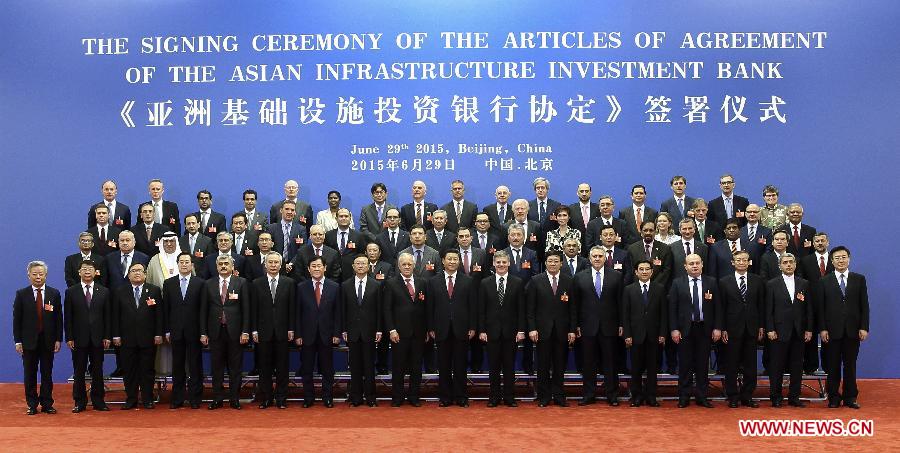

 |
| Chinese President Xi Jinping (9th R Front) meets with representatives of the prospective founding countries who attended the signing ceremony of the articles of the agreement of the Asian Infrastructure Investment Bank (AIIB) at the Great Hall of the People in Beijing, capital of China, June 29, 2015. Representatives of the 57 prospective AIIB founding countries signed the agreement on Monday in Beijing. (Xinhua/Lan Hongguang) |
BEIJING, June 28 (Xinhua) -- A "major-country diplomacy with Chinese characteristics" has taken shape since Xi Jinping became the top leader in late 2012.
Following are 26 key words or phrases that relate to this new style of diplomacy.
AIIB
The Asian Infrastructure Investment Bank (AIIB), a new development bank proposed by China, started operation on Jan. 16, 2016.
The new global multilateral financial institution, to support infrastructure projects in Asia, was formally established in Beijing on Dec. 25, 2015. Headquartered in Beijing, it now has 57 founding members.
AIIB also means a great deal to the global economic governance system. It is a product of the evolving economic landscape, and will help make the global economic governance system more just, equitable and effective.
Belt and Road Initiative
The Belt and Road initiative, which comprises the Silk Road Economic Belt and the 21st Century Maritime Silk Road, was first promulgated by Xi in 2013, who envisioned a trade and infrastructure network that connects Asia with Europe and Africa along the ancient Silk Road routes. Over 70 countries and organizations have voiced support for and willingness to join the initiative.
Climate Change
To fulfill its commitment to the Paris Agreement on climate change, China will cut its carbon emissions per unit of GDP by 60 to 65 percent by 2030 from the 2005 levels; increase non-fossil fuel sources in primary energy consumption to about 20 percent; and peak its carbon emissions by 2030. UN Secretary-General Ban Ki-moon said China had demonstrated great leadership with its remarkable commitment to the 2030 Agenda for Sustainable Development.
Destiny
The concept of "a community of common destiny" was first raised in a report approved by the 18th National Congress of the Communist Party of China (CPC) in 2012, expressing the hope of the Chinese people to build a better world together with people from other countries.
It underlines that all nations should raise the awareness that everyone on earth is a member of the community of common destiny, meaning there is a common responsibility to pull together in times of trouble, and strive for common development and lasting peace.
Economic Governance
According to a communique issued after the Fifth Plenary Session of the 18th CPC Central Committee, in the five years from 2016, China will further integrate its economy with the wider global economy, and pursue an open strategy of mutual benefit and win-win, while participating in global economic governance and the provision of public goods, raise its institutional discourse power in global economic governance and establish a far-ranging community of shared interests.
FTA
The latest free trade agreements (FTAs) between China and the Republic of Korea (ROK), and between China and Australia, shows that a "grand free trade strategy" is taking shape, bringing the nation closer to establishing a global free trade network and implementing deeper domestic reforms.
China has signed and implemented 14 FTAs covering 22 countries and regions across Asia, Latin America, Oceania and Europe.
G20
China will host the 2016 G20 Summit in the eastern city of Hangzhou on Sept. 4 to 5 under the theme "Building an innovative, invigorated, interconnected and inclusive world economy."
Host
China has hosted the Conference on Interaction and Confidence Building Measures in Asia (CICA) summit; the Asia-Pacific Economic Forum (APEC) summit; and is preparing for the upcoming G20 summit.
These events provide important opportunities for China to promote multilateral diplomacy at home. China's surging international influence has been translated into increasing global attention, hence, the more active diplomatic push on the home court.
Innovation
Innovation will drive development in the five years from 2016, and China understands how important innovation cooperation with foreign countries will be. For example, China and Switzerland agreed to build an innovative strategic partnership during Swiss President Johann Schneider-Ammann's visit to China in April 2016. It is the first time China has established an innovative partnership with any other country.
Justice
In its relations with developing countries, China applies a more balanced approach between upholding justice and seeking interests, which means it will put justice first, and pay more attention to the needs of developing countries.
Korean Peninsula
As a neighbor of the Korean Peninsula, China plays a vital role in maintaining peace and stability in the region. China supports the denuclearization of the peninsula, opposes conflict and seeks to safeguard the legitimate security rights of all members in the region. This reflects China's commitment to resolving disputes peacefully through dialogue and negotiations.
Legitimate Rights
The actions China has taken in the South China Sea are legitimate reactions to safeguard its territorial sovereignty. China will continue to take reasonable and legitimate approaches to safeguard its territorial sovereignty and maritime rights and interests.
Major-Power Relationship
In 2013, President Xi and his U.S. counterpart Barack Obama agreed to build a new type of major-power relationship between the two countries at the Annenberg Estate in California. Two years later, Xi made his first state visit to the United States. His trip has boosted China-U.S. relations and lifted "trans-Pacific cooperation" to a new level.
Neighborhood Diplomacy
In October 2013, Xi proposed a new philosophy of neighborhood diplomacy featuring amity, sincerity, mutual benefit and inclusiveness. He stressed that the Chinese Dream should chime with similar visions of neighboring countries; planting the seeds of a community of common destiny into the region.
Opening up
China's economic miracle started decades ago with two major policies, the reform and opening up. Xi said that China will continue to contribute to global development and pursue an opening up strategy driven by mutual benefit. The door to China will never close and all countries are welcome to ride on its development.
Partnership
China has established partnerships in various forms with more than 80 countries, regions and organizations under the principle of building a global network of partnership while abiding by the principle of non-alignment.
Quota Reform
On Jan. 27, 2016, the International Monetary Fund (IMF) publicized the 2010 Plan for Quota and Governance Reform.
According to the plan, around 6 percent of quota shares were shifted to dynamic emerging markets and developing countries, making China the third largest shareholder of the IMF with quota rising from 3.996 percent to 6.394 percent.
Rejuvenation
The Chinese Dream, championed by Xi in late 2012, is to build a moderately prosperous society and realize national rejuvenation. Chinese diplomacy is aimed at creating a more stable and friendly external environment for this to be realized.
Security Concept
President Xi Jinping proposed a new concept of Asian security in 2014. In sharp contrast to the decades-old Post-Cold War security system, the new approach aims to establish a mechanism that stresses common, comprehensive, cooperative and sustainable security to tackle rising challenges facing the region.
At the third Nuclear Security Summit (NSS) in The Hague, Xi first proposed "a rational, coordinated and balanced" nuclear security concept and called for a global nuclear security system featuring fairness and win-win cooperation.
Ten Cooperation Plan
At the Johannesburg Summit of the Forum on China-Africa Cooperation, Xi announced ten major China-Africa cooperation plans for the next three years, backed by 60 billion U.S. dollars, including interest free loans and preferential policies.
Unprecedented
Russian President Vladimir Putin said that trust between Russia and China had reached an unprecedented level.
The China-Russia Comprehensive Strategic Partnership of Coordination features mutual support on issues concerning core interests such as sovereignty, security and territorial integrity, and close coordination in solving major international and regional issues and propelling large-scale cooperative programs.
V-day
Dozens of heads of state and governments attended China's Victory Day celebrations on Sept. 3, 2015. The event commemorated the 70th anniversary of the end of World War II.
World Order
When addressing the annual high-level general debate of the 70th session of the United Nations General Assembly at the UN headquarters, Xi said China will stick to a path of peaceful development, dedicate itself to defending the existing world order founded on the UN Charter, and continue to support the global body.
Xi-style
President Xi Jinping pointed out that China must develop a distinctive diplomatic approach befitting its role as a major country, so that diplomacy will show salient Chinese features -- style and confidence. China's relations with the outside world have started new chapters. Some foreign media outlets believe that China's diplomatic stance sends a signal -- Xi-style diplomacy has taken shape.
Year
China has launched various people-to-people exchange events with a number of countries, such as the China-U.S. Tourism Year; the China-Russia Media Exchange year; "the Year of Languages" program between China and Germany; and China-India Tourism Year. These colorful events play an important role in enhancing mutual understanding and friendship.
Zero-sum Game, No!
In a signed article run by the state-run newspaper Russian Gazette in 2015, Xi said the bitter lessons drawn from WWII teaches that a "winner-takes-it-all" or zero-sum mindsets contradict coexistence, peace and development. Conditions today are more favorable than ever to achieve peace and development. He called for efforts to build a new type of international relations with win-win cooperation at its core.
Day|Week

 China's first intelligent security robot debuts in Chongqing
China's first intelligent security robot debuts in Chongqing A Total of 3,552 Subscribers Vanish In Two Days; YouTube Closes All Doors to Users’ Inquiries
A Total of 3,552 Subscribers Vanish In Two Days; YouTube Closes All Doors to Users’ Inquiries Out of this world! Futuristic UFO-shaped yacht has its own garden and a stunning underwater viewing deck
Out of this world! Futuristic UFO-shaped yacht has its own garden and a stunning underwater viewing deck An old tea house in Chengdu
An old tea house in Chengdu Furious Customer Crushes All the Buns from Vendor Just Because He Was Given the Wrong Flavor
Furious Customer Crushes All the Buns from Vendor Just Because He Was Given the Wrong Flavor 20 post-90s couples hold ’naked marriage‘ in E. China
20 post-90s couples hold ’naked marriage‘ in E. China Female official wearing traditional Han costume to promote local tourism
Female official wearing traditional Han costume to promote local tourism Over 12,000 Runners Seek Medical Care in S China’s Marathon
Over 12,000 Runners Seek Medical Care in S China’s Marathon Six Luxury Sports Cars Totaled after Fail Attempts to Cross China’s Most Perilous Highway Linking SW China’s Sichuan and Tibet
Six Luxury Sports Cars Totaled after Fail Attempts to Cross China’s Most Perilous Highway Linking SW China’s Sichuan and Tibet Incredible Transformation: “Witch Child”Whose Parents Left Him for Dead in Nigerian Makes Speedy Recovery
Incredible Transformation: “Witch Child”Whose Parents Left Him for Dead in Nigerian Makes Speedy Recovery